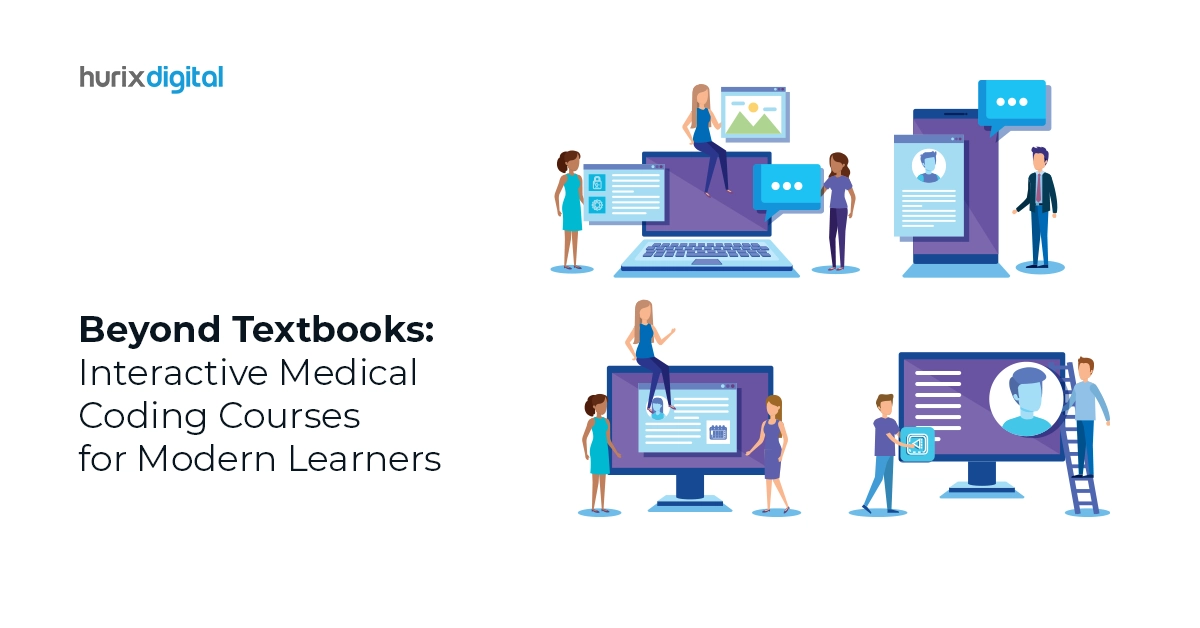
Beyond Textbooks: Interactive Medical Coding Courses for Modern Learners
Summary
Learn about interactive medical coding courses designed for modern learners. This article explores innovative approaches to teaching medical coding beyond traditional textbooks.
Employment opportunities in medical coding are rising in clinics, hospitals, physician offices, and other healthcare settings. Medical coders ensure that insurance companies have the data they require to reimburse physicians and hospitals for the treatments and services they render.
For accurate billing, efficient operations, and regulatory compliance, medical coding is essential today. However, traditional textbook-based learning approaches might not be enough to give today’s students the real-world knowledge and experience they need to succeed in the rapidly expanding medical coding industry.
Interactive medical coding courses are a game-changer for aspiring coders who want to improve their abilities more effectively and engagingly.
This article outlines the various unique features of interactive medical coding courses, their benefits over traditional textbooks, and more. Let’s get started!
Table of Contents:
- The Limitations of Traditional Textbook Learning
- The Rise of Interactive Learning of Medical Coding
- Features of Interactive Medical Coding Courses
- Benefits of Interactive Medical Coding Courses
- How to Choose the Right Medical Coding Courses?
- Takeaway
The Limitations of Traditional Textbook Learning
Even though textbooks have long been a part of education, they frequently fall short of giving students a fully interactive and immersive learning experience.
In particular, medical coding involves intricate code sets, rules, and real-world situations that can be difficult to understand from static text and theory alone.
Moreover, the healthcare industry is continuously changing, as evidenced by the frequent updates to coding standards and laws. Because textbooks are static, they may find it difficult to adapt to these changes, which puts students at a disadvantage in staying up to date on industry trends and optimal procedures.
The Rise of Interactive Learning of Medical Coding
As a result of the realization that medical coding education needs to be more dynamic and interesting, interactive courses have become an invaluable resource for today’s students. These classes make use of technology to provide an interactive learning environment that goes beyond the limitations of conventional textbooks.
Learners can gain practical medical coding skills necessary for advancement through blended learning in healthcare that includes interactive exercises, multimedia tools, and real-world case studies.
Also Read: Innovative Education Solutions the Healthcare Industry Can Make Use of in 2024
Features of Interactive Medical Coding Courses
The various aspects of interactive medical coding courses that enhance the learning outcomes and requisite skills of coding students are as follows:
1. Multimedia Resources
Multimedia content like movies, animations, and audio recordings are used in engaging medical curricula to improve the educational process. By reinforcing difficult concepts, visual and auditory aids improve the material’s engagement and comprehension.
Watching a video demonstration of coding techniques can help learners gain hands-on knowledge of applying codes in real-world scenarios.
2. Interactive Exercises and Simulations
Interactive exercises and simulations are crucial components of interactive medical coding courses. Through these exercises, students can get experience assigning codes, navigating case scenarios, and receiving immediate performance feedback.
Additionally, students can enhance their efficiency and accuracy in coding while obtaining important experience in a mock healthcare setting.
3. Real-World Case Studies
Real-world case studies are frequently included in interactive courses to assist students in applying their knowledge of coding to real-world scenarios. Learners are required to accurately analyze and code complex patient scenarios, medical records, and billing information presented in these case studies.
Through completing these case studies, students strengthen their critical thinking abilities and gain experience navigating the challenges of practical coding exercises.
4. Collaboration and Discussion Forums
Discussion forums and collaboration tools in interactive courses facilitate peer-to-peer interaction and communication. Students can interact with their peers through discussions, questions, and insight sharing, fostering a collaborative learning environment.
Peer-to-peer learning facilitates the acquisition of diverse viewpoints, idea sharing, and a deeper comprehension of medical coding concepts.
Benefits of Interactive Medical Coding Courses
Interactive medical coding courses meet the various needs of contemporary learners by providing a thorough and engaging learning environment. Here are some of its top-rated benefits:
1. Increased Engagement
Interactive medical coding courses aim to maintain students’ motivation and engagement throughout their learning process.
These courses offer a more immersive learning experience that caters to a variety of learning styles by incorporating interactive elements like simulations, quizzes, and multimedia content.
2. Practical Experience
Engaging in hands-on practice is one of the main benefits of interactive courses. Students can practice assigning codes, apply their knowledge in practical situations, and get fast performance feedback.
This hands-on experience helps students develop their confidence in their coding abilities while also reinforcing what they have learned.
3. Instant Evaluation and Progress Monitoring
Students enrolled in interactive courses can monitor their progress over time and pinpoint areas for betterment by receiving immediate feedback on their assignments.
Real-time feedback can be helpful for learners who want to identify their abilities and shortcomings and modify their study strategies accordingly.
4. Flexibility and Accessibility
With interactive medical coding courses, learners can study at their speed and on their schedule. Thanks to the availability of course materials on a wide range of devices, learning coding skills is now easier and more readily available than ever.
5. Relevant and Updated Learning Resources
It’s critical to stay up to date on the most recent coding guidelines and industry trends in a field as dynamic as medical coding.
Interactive courses are regularly updated to keep up with changes in laws and current standards to ensure that students receive the latest and most relevant knowledge to help them thrive in their careers.
How to Choose the Right Medical Coding Courses?
Selecting a medical coding education program tailored to your desired career specialty is a wise move. When selecting online medical coding programs, take into account the following factors:
- Accreditation: Ensure that a prestigious accrediting body, like the Commission on Accreditation for Health Informatics and Information Management Education (CAHIIM), accredits the medical coding course that you pick.
- Curriculum and Subject Matter: Choose a medical coding course that offers thorough instruction in the human body, medical terminology, and coding schemes like CPT and ICD. Look for courses that offer practical instruction in real-world coding scenarios and software.
- Qualifications of Instructors: Select a medical coding course taught by professionals with certification and experience in the field. Seek out instructors with credentials like Certified Coding Specialist (CCS) or Certified Professional Coder (CPC).
Also Read: Healthcare Access for All: Navigating USA’s Digital Accessibility Standards
Takeaway
As the demand for qualified medical coders grows, there is a pressing need for creative and interesting learning materials. Interactive medical coding courses provide a cutting-edge and efficient method of instruction to help prospective coders gain the knowledge and skills necessary to succeed in this fast-paced industry.
If you are looking for EdTech solutions to create interactive medical coding courses, Hurix Digital is your perfect partner! Make use of our expertise to offer students engaging educational materials. We employ various immersive media solutions to raise overall learner engagement and retention rates.
Want to learn more? Contact us today!

Senior Vice President
A Business Development professional with >20 years of experience with strong capability to sell new solutions and develop new markets from scratch. New Market Entry Specialist with experience of working in two of the largest emerging markets – China & India. Also covered other key markets in APAC, US, EU & ME. Exceptional experience of conceptualizing, ideating and selling new learning technologies like VR AR, etc. across multiple industry verticals.




